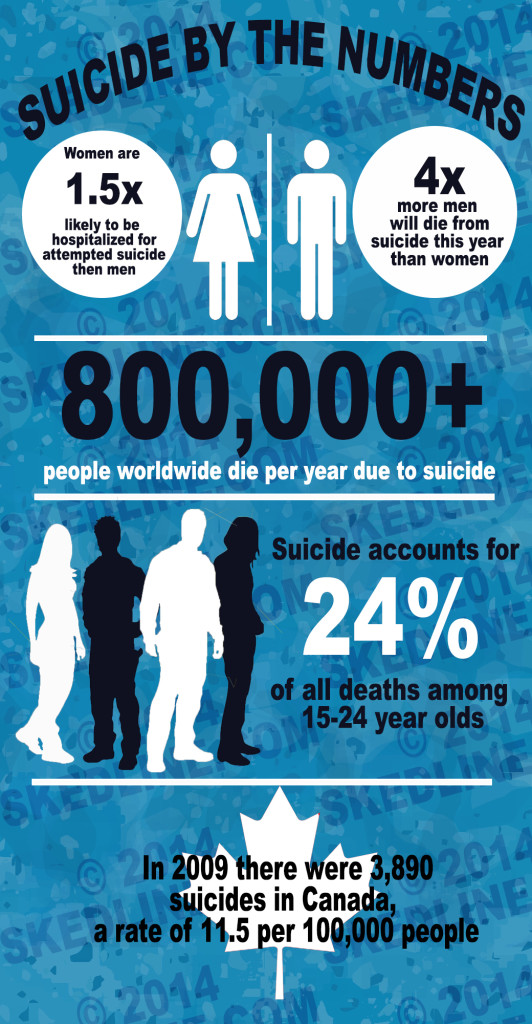

Canada drags its feet on a national suicide prevention strategy
Archive 2014 Sep 19, 2014 Sara Miller


A info-graph of suicide by the numbers. According to the World Health Organization, a person dies every 40 seconds around the world due to suicide. – Info-graphic created by Sara Miller
In the time that it takes a person to change and upload their Facebook profile photo, another person has taken their life. According to the new report: Prevent Suicide – A Global Imperative, released by the World Health Organization, an estimated 800,000 people globally die by suicide.
“This report is a call for action to address a large public health problem which has been shrouded in taboo for far too long” said Dr Margaret Chan, Director-General of WHO.
In Canada, over 3,700 people die from suicide a year or about 10 suicides per day. Those who have First Nations and Inuit backgrounds have some of the highest suicide rates in the country, with First Nation youths five to six times more often to die by suicide than non-Aboriginal youth.
Currently, 28 countries including Australia, the United States and United Kingdom have reported to have a national strategy for suicide prevention. Canada however is one of the few industrialized countries without an official strategy despite hosting a 1993 United Nations international meeting of experts to develop and implement supported suicide prevention guidelines.
Penny Knapp, founder of “Survivors of Suicide Loss”, said that Canada has been too slow implementing a strategy, despite the many suicide related deaths happening in the country.
“Canada had been dragging themselves on the pavement for so many years,” Knapp said. “Other countries have had a national suicide prevention strategy for years”.
Recently, Canada has made efforts towards developing a suicide prevention strategy. In 2012, Governor General David Johnston signed Bill C-300, a Federal Framework for Suicide Prevention into law. It means that the Government of Canada is now required to consulate with other members of government and interested non-governmental organizations to begin creating a framework.
But despite being a milestone for suicide prevention in Canada, Knapp who lost her son Nicholas, 20, to suicide in 2007 is not convinced.
“The Canadian government has been pumping money into research and organizations such as Canadian Mental Health and the Mental Health Commission,” she said. “They are getting paid to meet around the table but there is very little to show for the millions. Every life lost is priceless. Canadians need to know why suicide prevention is still not a priority in Canada.”
Penny and her family travelled to attend every conference and workshop they could but didn’t find any that met their needs. She created a memorial site Remembering Nicholas dedicated to her son, which evolved into the organization “Survivors of Suicide Loss”. Now with her husband and daughter(s), she acts as a facilitator and workshop organizer, talking and helping those who have lost someone to suicide or has thought of taking their own life.
In 2012, she also created a resource DVD for educators and for those dealing with the loss of a loved one from suicide. The DVD, which is segmented into four parts, also includes interviews from Knapp’s two daughters, Melanie and Marsha who talk about their experiences going through the grieving and healing process of their brothers’ suicide.
As a learning tool, Penny wanted survivors to take away more than just a story.
“I wanted it to be educational. There is no need to just go tell your story because everyone has one,” Knapp said. “It’s important for survivors to gain some knowledge and insight that they can take away to save lives.”
The World Health Organization report showed that suicide was also the second leading cause of death for persons in the 15 to 29-age range.
Humber North’s Student Wellness and Development Manager, Dr. Rummy Gill, said there are many misconceptions among the general public when it comes to the topic of suicide including the mental heath and seriousness of each case.
[soundcloud url=”https://api.soundcloud.com/tracks/167257559″ params=”color=0066cc&auto_play=false&hide_related=false&show_comments=true&show_user=true&show_reposts=false” width=”100%” height=”166″ iframe=”true” /]
Humber College currently offers students and community members a workshop that quickly identifies and helps a person at risk for suicide.
“Applied Suicide Intervention Skills Training (ASIST) is a two day training workshop that prepares participants (students and community members) to be ready, willing and able to provide assistance to a person-at-risk of suicide,” said Bernadette Summers, ASIST trainer and Program Advisor for Continuing Education at Humber College.
“The goal of ASIST is to provide suicide first aid and keep a person-at-risk safe for now.”






